Unit6 Ancient stories第3课时grammar导学案
文档属性
| 名称 | Unit6 Ancient stories第3课时grammar导学案 | 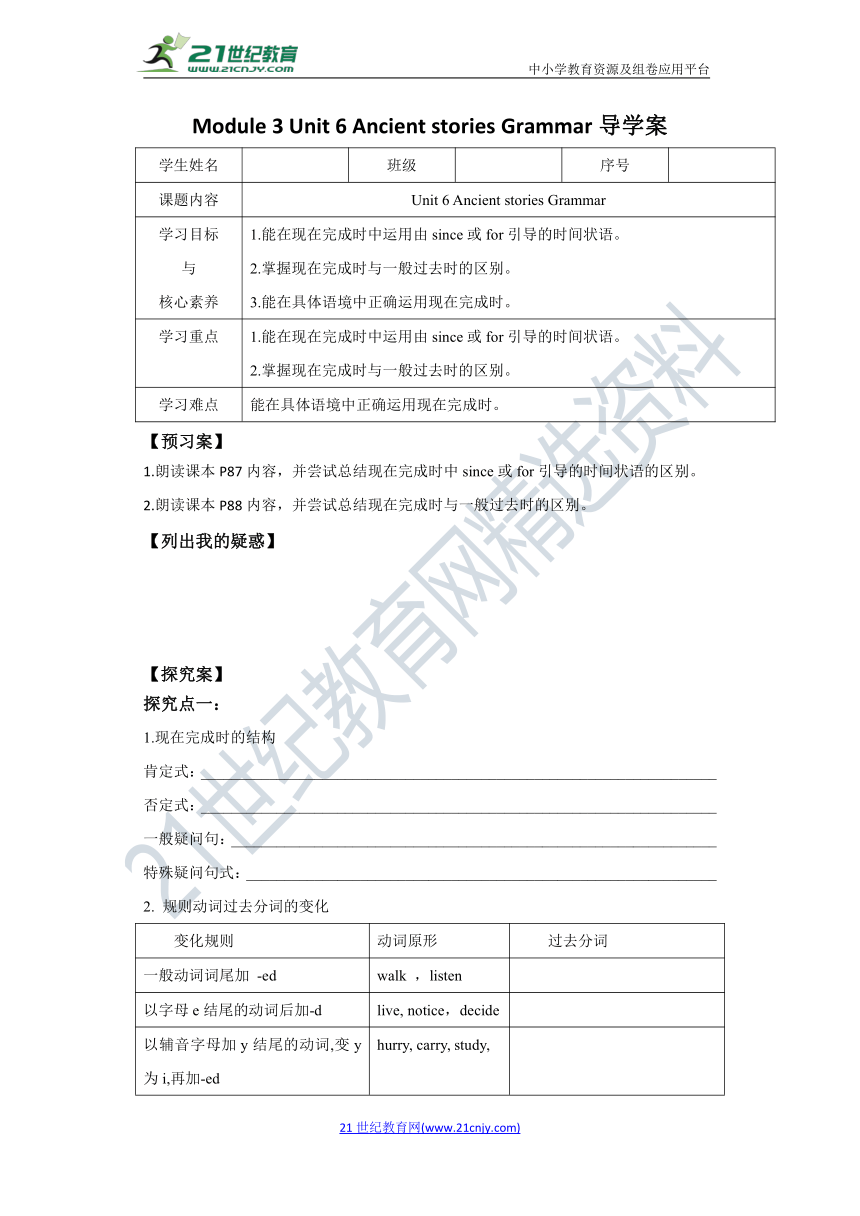 | |
| 格式 | zip | ||
| 文件大小 | 3.1MB | ||
| 资源类型 | 试卷 | ||
| 版本资源 | 牛津深圳版 | ||
| 科目 | 英语 | ||
| 更新时间 | 2020-11-23 15:49:24 | ||
图片预览

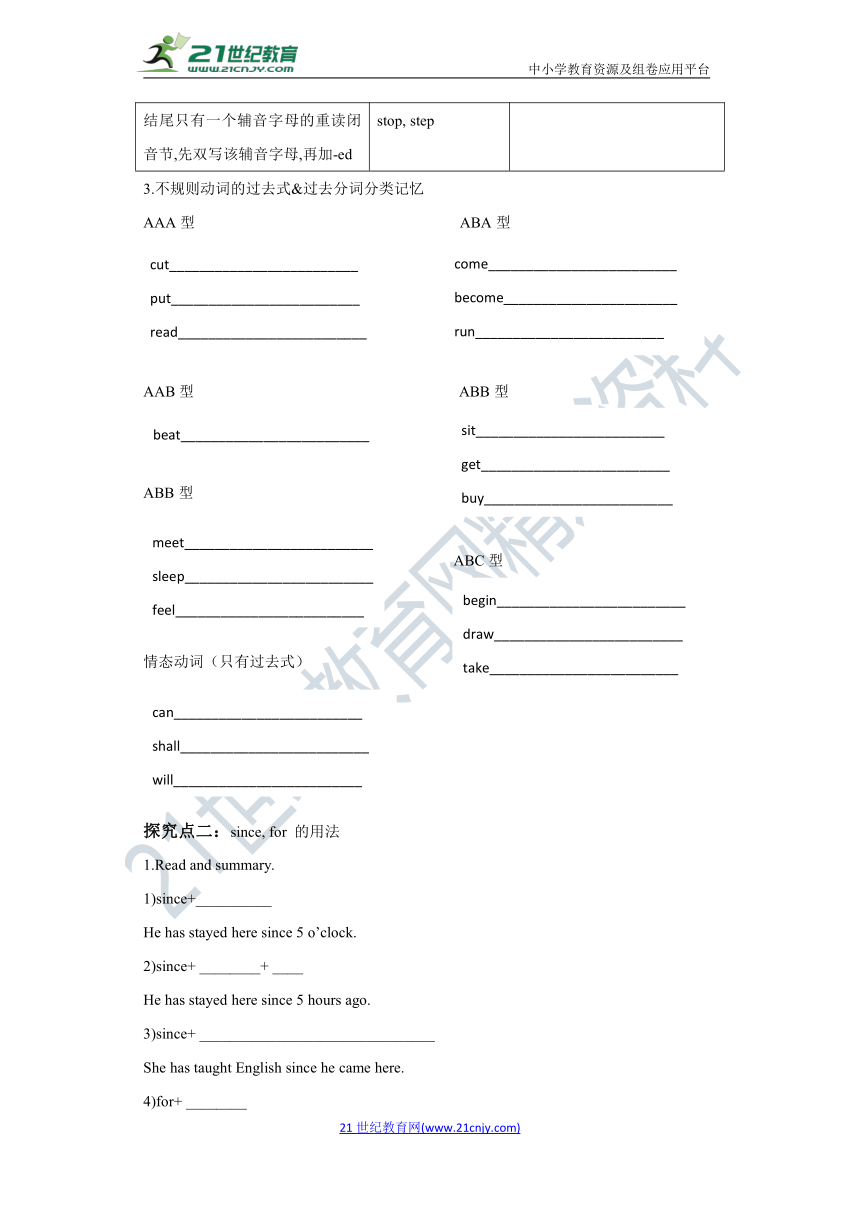
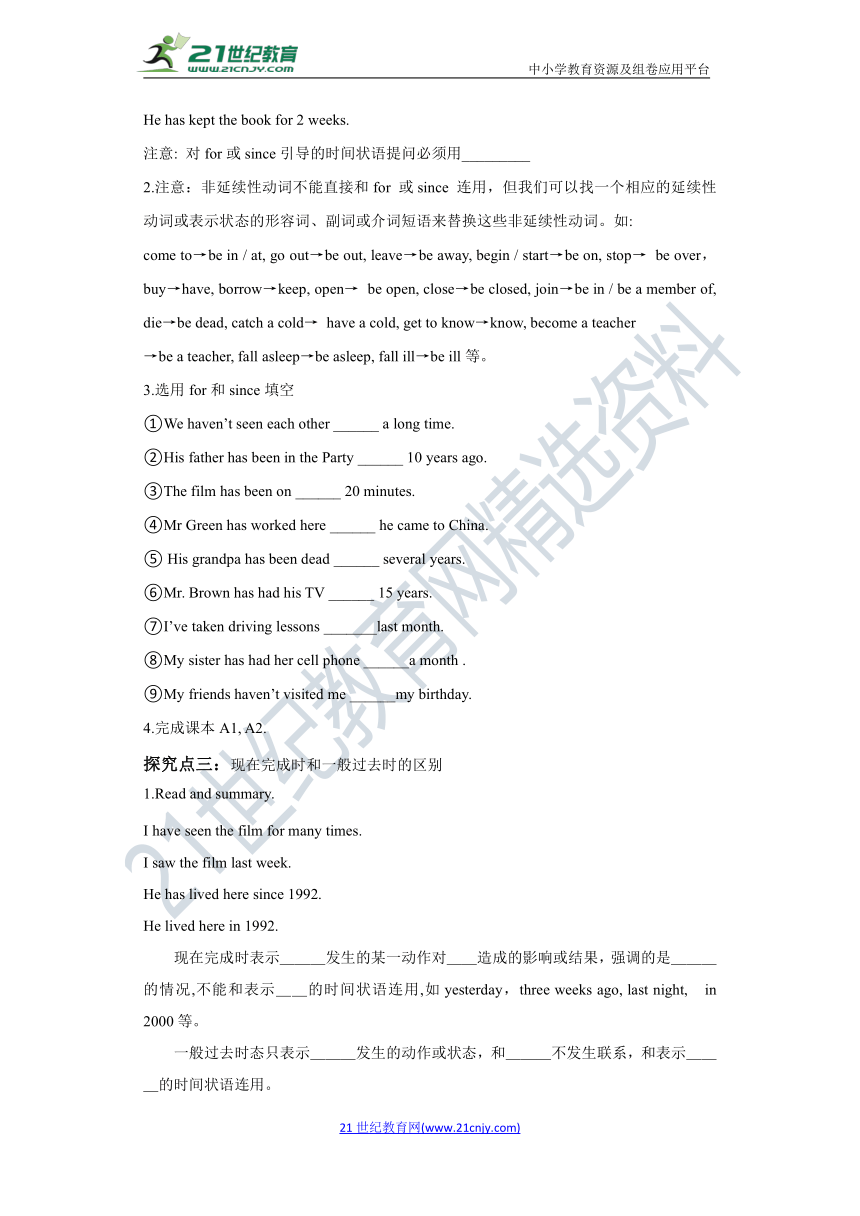
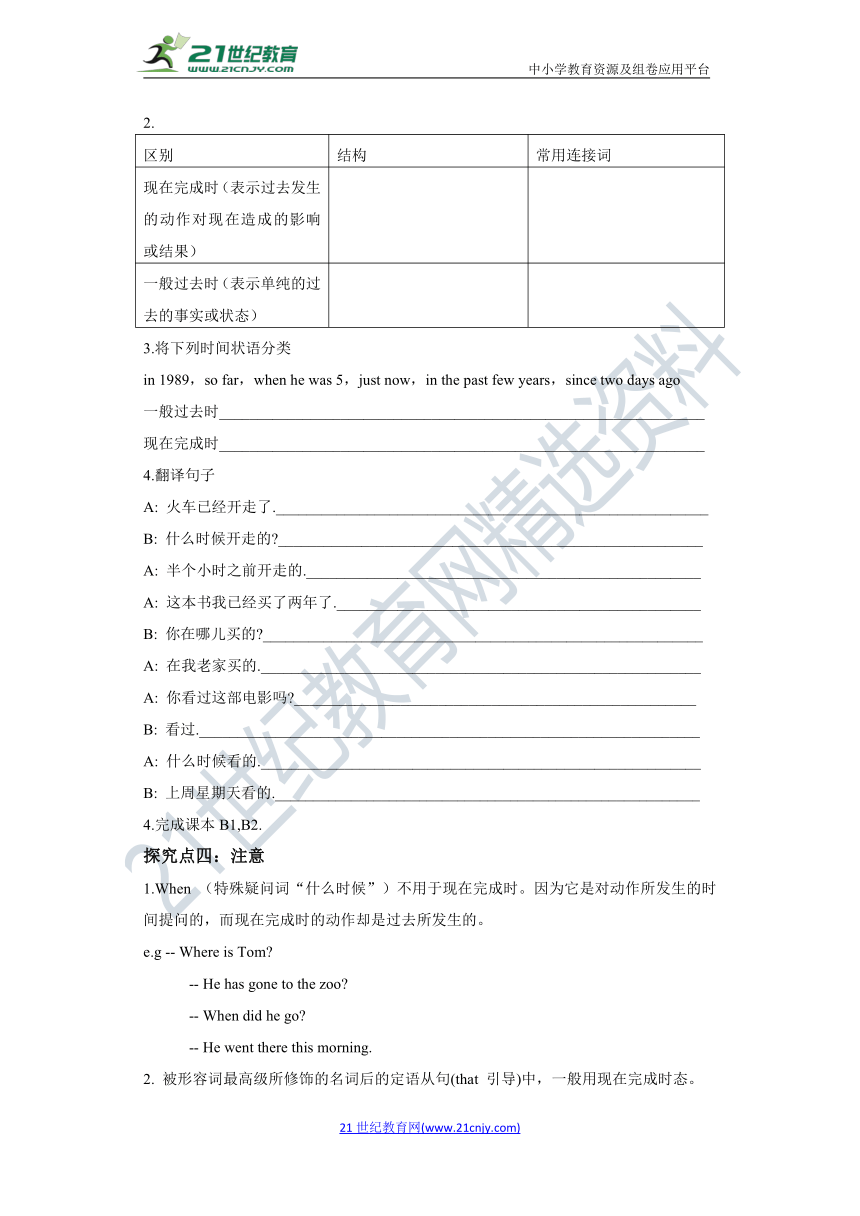
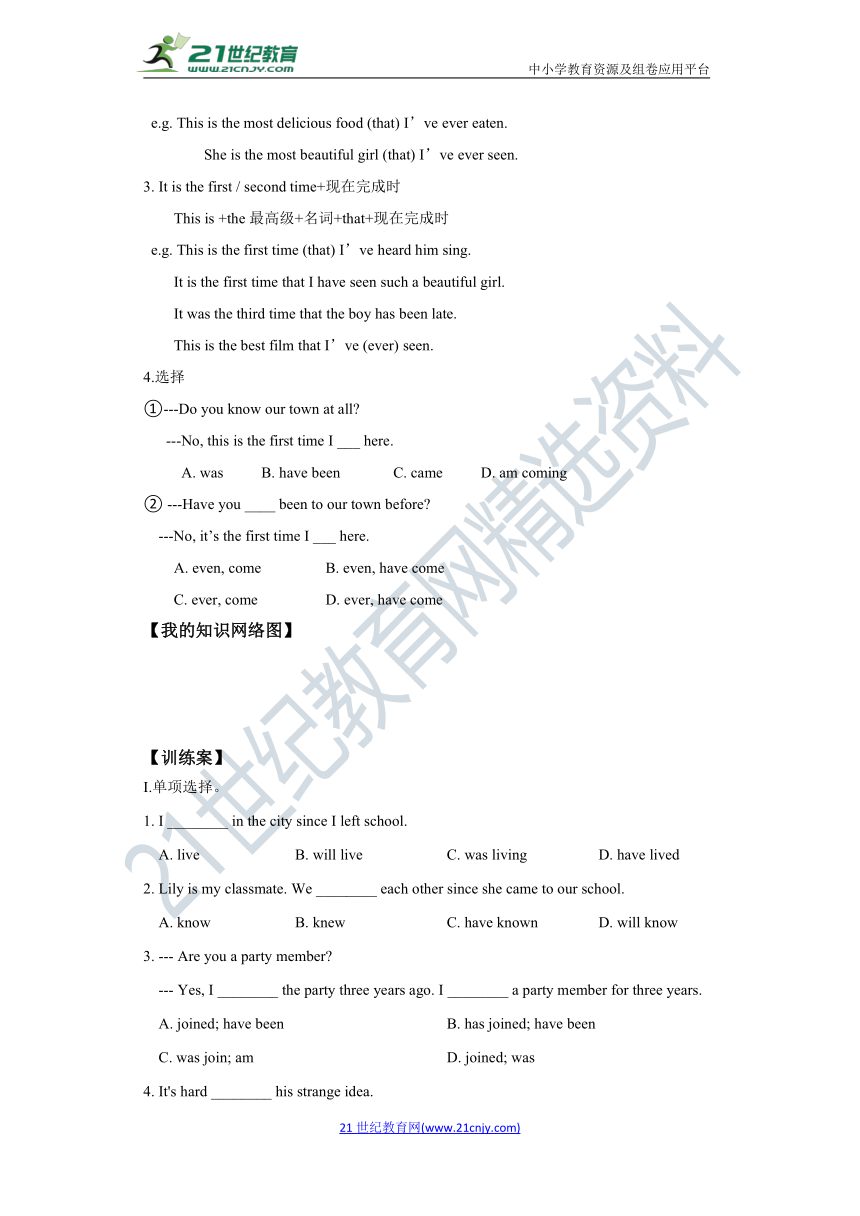
文档简介
中小学教育资源及组卷应用平台
Module 3 Unit 6 Ancient stories Grammar导学案
学生姓名
班级
序号
课题内容 Unit 6 Ancient stories Grammar
学习目标 与
核心素养 1.能在现在完成时中运用由since或for引导的时间状语。
2.掌握现在完成时与一般过去时的区别。
3.能在具体语境中正确运用现在完成时。
学习重点 1.能在现在完成时中运用由since或for引导的时间状语。
2.掌握现在完成时与一般过去时的区别。
学习难点 能在具体语境中正确运用现在完成时。
【预习案】
1.朗读课本P87内容,并尝试总结现在完成时中since或for引导的时间状语的区别。
2.朗读课本P88内容,并尝试总结现在完成时与一般过去时的区别。
【列出我的疑惑】
【探究案】
探究点一:
1.现在完成时的结构
肯定式:______________________________________
否定式:______________________________________
一般疑问句:_________________________________
特殊疑问句式:_____________________________
2. 规则动词过去分词的变化
变化规则 动词原形 过去分词
一般动词词尾加 -ed walk ,listen
以字母e结尾的动词后加-d live, notice,decide
以辅音字母加y结尾的动词,变y为i,再加-ed hurry, carry, study,
结尾只有一个辅音字母的重读闭音节,先双写该辅音字母,再加-ed stop, step
3.不规则动词的过去式&过去分词分类记忆
AAA型 ABA型
AAB型 ABB型
ABB型
ABC型
情态动词(只有过去式)
探究点二:since, for 的用法
1.Read and summary.
1)since+__________
He?has?stayed?here?since?5?o’clock.
2)since+ ________+ ____
He?has?stayed?here?since?5?hours?ago.
3)since+ _______________________________
She?has?taught?English?since?he?came?here.
4)for+ ________
He has kept the book for 2 weeks.
注意: 对for或since引导的时间状语提问必须用_________
2.注意:非延续性动词不能直接和for 或since 连用,但我们可以找一个相应的延续性动词或表示状态的形容词、副词或介词短语来替换这些非延续性动词。如:
come to→be in / at, go out→be out, leave→be away, begin / start→be on, stop→ be over,buy→have, borrow→keep, open→ be open, close→be closed, join→be in / be a member of, die→be dead, catch a cold→ have a cold, get to know→know, become a teacher
→be a teacher, fall asleep→be asleep, fall ill→be ill等。
3.选用for和since填空
①We haven’t seen each other ______ a long time.
②His father has been in the Party ______ 10 years ago.
③The film has been on ______ 20 minutes.
④Mr Green has worked here ______ he came to China.
⑤ His grandpa has been dead ______ several years.
⑥Mr. Brown has had his TV ______ 15 years.
⑦I’ve taken driving lessons _______last month.
⑧My sister has had her cell phone ______a month .
⑨My friends haven’t visited me ______my birthday.
4.完成课本A1, A2.
探究点三:现在完成时和一般过去时的区别
1.Read and summary.
I have seen the film for many times.
I saw the film last week.
He has lived here since 1992.
He lived here in 1992.
现在完成时表示___发生的某一动作对__造成的影响或结果,强调的是___的情况,不能和表示__的时间状语连用,如yesterday,three weeks ago, last night, in 2000等。
一般过去时态只表示___发生的动作或状态,和___不发生联系,和表示___的时间状语连用。
2.
区别 结构 常用连接词
现在完成时(表示过去发生的动作对现在造成的影响或结果)
一般过去时(表示单纯的过去的事实或状态)
3.将下列时间状语分类
in 1989,so far,when he was 5,just now,in the past few years,since two days ago
一般过去时________________________________________________________________
现在完成时________________________________________________________________
4.翻译句子
A: 火车已经开走了._________________________________________________________
B: 什么时候开走的?________________________________________________________
A: 半个小时之前开走的.____________________________________________________
A: 这本书我已经买了两年了.________________________________________________
B: 你在哪儿买的?__________________________________________________________
A: 在我老家买的.__________________________________________________________
A: 你看过这部电影吗?_____________________________________________________
B: 看过.__________________________________________________________________
A: 什么时候看的.__________________________________________________________
B: 上周星期天看的.________________________________________________________
4.完成课本B1,B2.
探究点四:注意
1.When (特殊疑问词“什么时候”)不用于现在完成时。因为它是对动作所发生的时间提问的,而现在完成时的动作却是过去所发生的。
e.g -- Where is Tom?
-- He has gone to the zoo?
-- When did he go?
-- He went there this morning.
2. 被形容词最高级所修饰的名词后的定语从句(that 引导)中,一般用现在完成时态。
e.g. This is the most delicious food (that) I’ve ever eaten.
She is the most beautiful girl (that) I’ve ever seen.
3. It is the first / second time+现在完成时
This is +the最高级+名词+that+现在完成时
e.g. This is the first time (that) I’ve heard him sing.
It is the first time that I have seen such a beautiful girl.
It was the third time that the boy has been late.
This is the best film that I’ve (ever) seen.
4.选择
①---Do you know our town at all?
---No, this is the first time I ___ here.
A. was B. have been C. came D. am coming
② ---Have you ____ been to our town before?
---No, it’s the first time I ___ here.
A. even, come B. even, have come
C. ever, come D. ever, have come
【我的知识网络图】
【训练案】
Ⅰ.单项选择。
1. I ________ in the city since I left school.
A. live B. will live C. was living D. have lived
2. Lily is my classmate. We ________ each other since she came to our school.
A. know B. knew C. have known D. will know
3. --- Are you a party member?
--- Yes, I ________ the party three years ago. I ________ a party member for three years.
A. joined; have been B. has joined; have been
C. was join; am D. joined; was
4. It's hard ________ his strange idea.
A. understand B. understanding C. understood D. to understand
5. You ________your watch on Helen's desk yesterday.
A. left B. have left C. forgot D. have forgotten
Ⅱ.用括号中所给单词的适当形式填空
6. Mike ________ (become) a worker in the factory in 1998. He ________ (work) there since then.
7. He ________________ (sleep) very late yesterday.
8. Mrs Green ________________ (teach) in No. 14 Middle School for ten years.
9. I ________________ (know) him since 2006
10. My parents expect me to pass the examination ________________ (success).
Ⅲ.完形填空
Justin and Mary were on holiday at their uncle’s house near a lake, but they woke up early. The night before, Uncle Thomas told them a 16 about the Foggy Figure that haunts (以鬼魂形式出现) the lake. Justin and Mary wanted to see the Foggy Figure before their holiday was over.
It was only 5:00 am. Justin walked out and Mary 17 him out of the door. It was foggy and 18 to see anything.
“Do you believe the story?” Mary asked. She had a 19 that Uncle Thomas’ story was not real.
“I think it is real,” Justin said. “Mom and Dad will be really 20 if we go out on the lake alone in this fog.”
Mary said, “Maybe we don’t have to go anywhere. We can 21 in the boat when it stops near the beach.
Justin and Mary climbed into the boat and sat together. Both of them felt 22 now. They looked around, and suddenly Mary shouted, “The Foggy Figure!” It was sitting in the 23 with them!
Justin and Mary felt afraid, but then they heard a laugh. Justin 24 the Foggy Figure. “Uncle Thomas?”
“I knew that story would get you two out of bed 25 enough to take a boat ride with me,” Uncle Thomas said.
11. A. report B. story C. meeting
12. A. picked B. pushed C. followed
13. A. hard B. easy C. right
14. A. mistake B. problem C. feeling
15. A. special B. worried C. popular
16. A. dance B. run C. sit
17. A. surprised B. nervous C. bored
18. A. boat B. shop C. garden
19. A. looked at B. looked after C. looked for
20. A. happily B. early C. slowly
Ⅳ.阅读理解
The story of the fall of Troy is one of the oldest stories in history. It dates back to around 800 BC, to a poem written by a man called Homer. The poem is called The Iliad(《伊利亚 待》). Ilium is the Latin name for Troy.
The story is a myth(神话), but many believe the city of Troy actually existed. Some people have thought it was in modern Turkey. Others have suggested it may have been in central Europe, northern Europe or even England.
You could write a long book on all the paintings, music and stories about Achilles. His name is used for many things. Since 1744, nine British warships have been named after him, for example.
A Trojan horse is a saying that now means something that seems friendly, but it is actually a trick to hurt you. Some kinds of computer viruses (病毒) re now called Trojans. An Achilles heel (脚后跟) means a person' s main weakness. The Achilles tendon(跟腱) is a medical name for part of your heel at the back.
21. Who wrote the poem of Troy?
A. Iliad. B. Homer. C. Achilles. D. Ilium.
22. What's the meaning of the underlined word?
A. 存在 B. 不存在 C. 不真实的 D. 虚拟的
23. How many British warships have been named after Achilles since 1744?
A. Seven. B. Eight. C. Nine. D. Ten
24. Which of the following is NOT true?
A. The story of the fall of Troy is the oldest story in history.
B. A Trojan horse means something that seems friendly, but it is actually a trick to hurt you.
C. Some kinds of computer viruses are now called Trojans.
D. An Achilles heel means a person's main weakness.
25. Where can you find this article?
A. In the newspaper. B. In the scientific book.
C. In the advertisements. D. In the novel.
【教与学的反思】
探究案答案:
探究点一:
1.
2.
3.
探究点二:
1.
3.
4.A1
A2
探究点三:
1.
2.
4.
5.B1
B2
探究点四:
4.BD
训练案答案:
Ⅰ.1-5 DCADA
Ⅱ. 6.became has worked 7. slept 8. has taught 9. have known 10. successfully
Ⅲ. 11-15 BCACB 16-20 CBAAB
Ⅳ. 21-25 BACAA
_21?????????è?????(www.21cnjy.com)_
Module 3 Unit 6 Ancient stories Grammar导学案
学生姓名
班级
序号
课题内容 Unit 6 Ancient stories Grammar
学习目标 与
核心素养 1.能在现在完成时中运用由since或for引导的时间状语。
2.掌握现在完成时与一般过去时的区别。
3.能在具体语境中正确运用现在完成时。
学习重点 1.能在现在完成时中运用由since或for引导的时间状语。
2.掌握现在完成时与一般过去时的区别。
学习难点 能在具体语境中正确运用现在完成时。
【预习案】
1.朗读课本P87内容,并尝试总结现在完成时中since或for引导的时间状语的区别。
2.朗读课本P88内容,并尝试总结现在完成时与一般过去时的区别。
【列出我的疑惑】
【探究案】
探究点一:
1.现在完成时的结构
肯定式:______________________________________
否定式:______________________________________
一般疑问句:_________________________________
特殊疑问句式:_____________________________
2. 规则动词过去分词的变化
变化规则 动词原形 过去分词
一般动词词尾加 -ed walk ,listen
以字母e结尾的动词后加-d live, notice,decide
以辅音字母加y结尾的动词,变y为i,再加-ed hurry, carry, study,
结尾只有一个辅音字母的重读闭音节,先双写该辅音字母,再加-ed stop, step
3.不规则动词的过去式&过去分词分类记忆
AAA型 ABA型
AAB型 ABB型
ABB型
ABC型
情态动词(只有过去式)
探究点二:since, for 的用法
1.Read and summary.
1)since+__________
He?has?stayed?here?since?5?o’clock.
2)since+ ________+ ____
He?has?stayed?here?since?5?hours?ago.
3)since+ _______________________________
She?has?taught?English?since?he?came?here.
4)for+ ________
He has kept the book for 2 weeks.
注意: 对for或since引导的时间状语提问必须用_________
2.注意:非延续性动词不能直接和for 或since 连用,但我们可以找一个相应的延续性动词或表示状态的形容词、副词或介词短语来替换这些非延续性动词。如:
come to→be in / at, go out→be out, leave→be away, begin / start→be on, stop→ be over,buy→have, borrow→keep, open→ be open, close→be closed, join→be in / be a member of, die→be dead, catch a cold→ have a cold, get to know→know, become a teacher
→be a teacher, fall asleep→be asleep, fall ill→be ill等。
3.选用for和since填空
①We haven’t seen each other ______ a long time.
②His father has been in the Party ______ 10 years ago.
③The film has been on ______ 20 minutes.
④Mr Green has worked here ______ he came to China.
⑤ His grandpa has been dead ______ several years.
⑥Mr. Brown has had his TV ______ 15 years.
⑦I’ve taken driving lessons _______last month.
⑧My sister has had her cell phone ______a month .
⑨My friends haven’t visited me ______my birthday.
4.完成课本A1, A2.
探究点三:现在完成时和一般过去时的区别
1.Read and summary.
I have seen the film for many times.
I saw the film last week.
He has lived here since 1992.
He lived here in 1992.
现在完成时表示___发生的某一动作对__造成的影响或结果,强调的是___的情况,不能和表示__的时间状语连用,如yesterday,three weeks ago, last night, in 2000等。
一般过去时态只表示___发生的动作或状态,和___不发生联系,和表示___的时间状语连用。
2.
区别 结构 常用连接词
现在完成时(表示过去发生的动作对现在造成的影响或结果)
一般过去时(表示单纯的过去的事实或状态)
3.将下列时间状语分类
in 1989,so far,when he was 5,just now,in the past few years,since two days ago
一般过去时________________________________________________________________
现在完成时________________________________________________________________
4.翻译句子
A: 火车已经开走了._________________________________________________________
B: 什么时候开走的?________________________________________________________
A: 半个小时之前开走的.____________________________________________________
A: 这本书我已经买了两年了.________________________________________________
B: 你在哪儿买的?__________________________________________________________
A: 在我老家买的.__________________________________________________________
A: 你看过这部电影吗?_____________________________________________________
B: 看过.__________________________________________________________________
A: 什么时候看的.__________________________________________________________
B: 上周星期天看的.________________________________________________________
4.完成课本B1,B2.
探究点四:注意
1.When (特殊疑问词“什么时候”)不用于现在完成时。因为它是对动作所发生的时间提问的,而现在完成时的动作却是过去所发生的。
e.g -- Where is Tom?
-- He has gone to the zoo?
-- When did he go?
-- He went there this morning.
2. 被形容词最高级所修饰的名词后的定语从句(that 引导)中,一般用现在完成时态。
e.g. This is the most delicious food (that) I’ve ever eaten.
She is the most beautiful girl (that) I’ve ever seen.
3. It is the first / second time+现在完成时
This is +the最高级+名词+that+现在完成时
e.g. This is the first time (that) I’ve heard him sing.
It is the first time that I have seen such a beautiful girl.
It was the third time that the boy has been late.
This is the best film that I’ve (ever) seen.
4.选择
①---Do you know our town at all?
---No, this is the first time I ___ here.
A. was B. have been C. came D. am coming
② ---Have you ____ been to our town before?
---No, it’s the first time I ___ here.
A. even, come B. even, have come
C. ever, come D. ever, have come
【我的知识网络图】
【训练案】
Ⅰ.单项选择。
1. I ________ in the city since I left school.
A. live B. will live C. was living D. have lived
2. Lily is my classmate. We ________ each other since she came to our school.
A. know B. knew C. have known D. will know
3. --- Are you a party member?
--- Yes, I ________ the party three years ago. I ________ a party member for three years.
A. joined; have been B. has joined; have been
C. was join; am D. joined; was
4. It's hard ________ his strange idea.
A. understand B. understanding C. understood D. to understand
5. You ________your watch on Helen's desk yesterday.
A. left B. have left C. forgot D. have forgotten
Ⅱ.用括号中所给单词的适当形式填空
6. Mike ________ (become) a worker in the factory in 1998. He ________ (work) there since then.
7. He ________________ (sleep) very late yesterday.
8. Mrs Green ________________ (teach) in No. 14 Middle School for ten years.
9. I ________________ (know) him since 2006
10. My parents expect me to pass the examination ________________ (success).
Ⅲ.完形填空
Justin and Mary were on holiday at their uncle’s house near a lake, but they woke up early. The night before, Uncle Thomas told them a 16 about the Foggy Figure that haunts (以鬼魂形式出现) the lake. Justin and Mary wanted to see the Foggy Figure before their holiday was over.
It was only 5:00 am. Justin walked out and Mary 17 him out of the door. It was foggy and 18 to see anything.
“Do you believe the story?” Mary asked. She had a 19 that Uncle Thomas’ story was not real.
“I think it is real,” Justin said. “Mom and Dad will be really 20 if we go out on the lake alone in this fog.”
Mary said, “Maybe we don’t have to go anywhere. We can 21 in the boat when it stops near the beach.
Justin and Mary climbed into the boat and sat together. Both of them felt 22 now. They looked around, and suddenly Mary shouted, “The Foggy Figure!” It was sitting in the 23 with them!
Justin and Mary felt afraid, but then they heard a laugh. Justin 24 the Foggy Figure. “Uncle Thomas?”
“I knew that story would get you two out of bed 25 enough to take a boat ride with me,” Uncle Thomas said.
11. A. report B. story C. meeting
12. A. picked B. pushed C. followed
13. A. hard B. easy C. right
14. A. mistake B. problem C. feeling
15. A. special B. worried C. popular
16. A. dance B. run C. sit
17. A. surprised B. nervous C. bored
18. A. boat B. shop C. garden
19. A. looked at B. looked after C. looked for
20. A. happily B. early C. slowly
Ⅳ.阅读理解
The story of the fall of Troy is one of the oldest stories in history. It dates back to around 800 BC, to a poem written by a man called Homer. The poem is called The Iliad(《伊利亚 待》). Ilium is the Latin name for Troy.
The story is a myth(神话), but many believe the city of Troy actually existed. Some people have thought it was in modern Turkey. Others have suggested it may have been in central Europe, northern Europe or even England.
You could write a long book on all the paintings, music and stories about Achilles. His name is used for many things. Since 1744, nine British warships have been named after him, for example.
A Trojan horse is a saying that now means something that seems friendly, but it is actually a trick to hurt you. Some kinds of computer viruses (病毒) re now called Trojans. An Achilles heel (脚后跟) means a person' s main weakness. The Achilles tendon(跟腱) is a medical name for part of your heel at the back.
21. Who wrote the poem of Troy?
A. Iliad. B. Homer. C. Achilles. D. Ilium.
22. What's the meaning of the underlined word?
A. 存在 B. 不存在 C. 不真实的 D. 虚拟的
23. How many British warships have been named after Achilles since 1744?
A. Seven. B. Eight. C. Nine. D. Ten
24. Which of the following is NOT true?
A. The story of the fall of Troy is the oldest story in history.
B. A Trojan horse means something that seems friendly, but it is actually a trick to hurt you.
C. Some kinds of computer viruses are now called Trojans.
D. An Achilles heel means a person's main weakness.
25. Where can you find this article?
A. In the newspaper. B. In the scientific book.
C. In the advertisements. D. In the novel.
【教与学的反思】
探究案答案:
探究点一:
1.
2.
3.
探究点二:
1.
3.
4.A1
A2
探究点三:
1.
2.
4.
5.B1
B2
探究点四:
4.BD
训练案答案:
Ⅰ.1-5 DCADA
Ⅱ. 6.became has worked 7. slept 8. has taught 9. have known 10. successfully
Ⅲ. 11-15 BCACB 16-20 CBAAB
Ⅳ. 21-25 BACAA
_21?????????è?????(www.21cnjy.com)_
